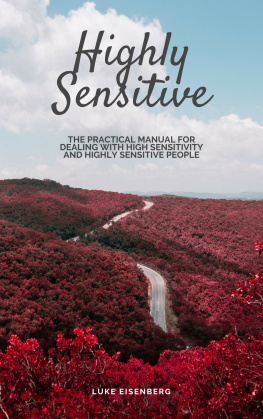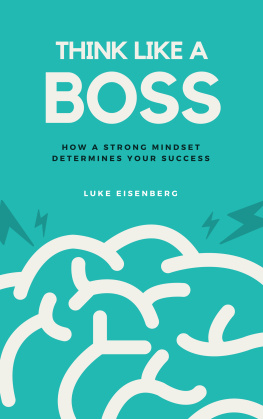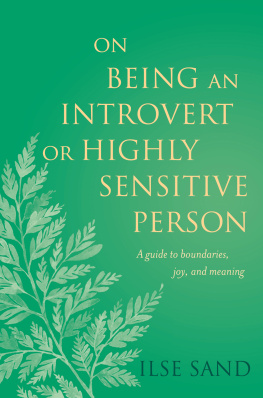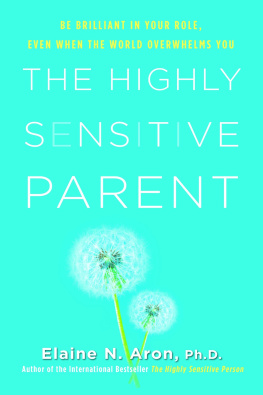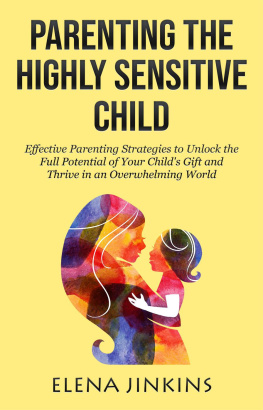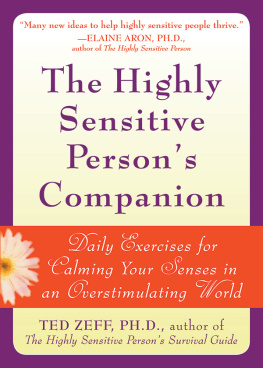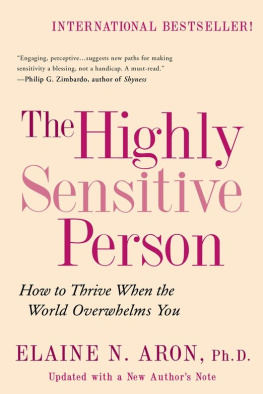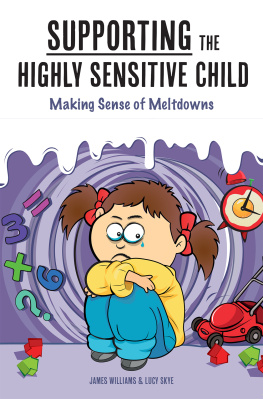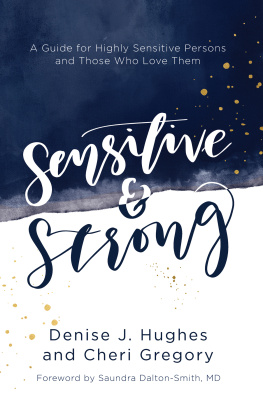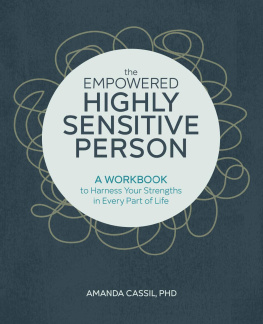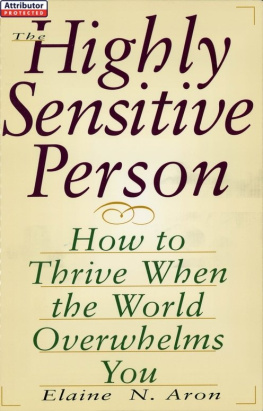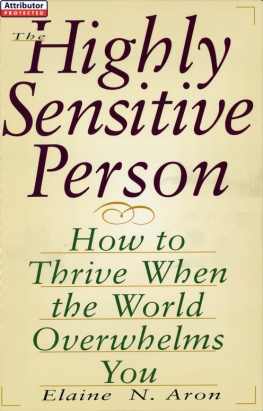Highly Sensitive:
The Practical Manual For Dealing With High Sensitivity And Highly Sensitive People
(High Sensitivity Guide: Including Many Tips And Tricks For Private And Professional Everyday Life)
Reproduction, translation, further processing or similar actions for commercial purposes as well as resale or other publications are not permitted without the written consent of the author.
Copyright 2019 - Luke Eisenberg
ISBN: 9783749407200
All rights reserved.
Introduction
What is it that all people, each for themselves and all together, want? What wish do they have that always drives them? It's the desire to accept oneself. It is the desire to simply be at peace with oneself, to be satisfied with oneself, and to be able to suffer oneself.
Many people fight with themselves all their lives. They see themselves in a bad light, they have inferiority complexes and they even condemn themselves. This can affect everyone, and there are people for whom it is much more difficult to accept themselves. We're talking about the highly sensitive among us.
Highly sensitive people perceive everything much more strongly than others. That's why they suffer much more from rejection. But they experience the rejection from others, because they are not like them. The rejection is transmitted and in the end many highly sensitive people reject themselves.
But what many overlook is that high sensitivity, like so many other things, has two sides. That means it's as much a curse as a gift. What's the difference? Only what the affected person himself makes of it. That is why it is so important that you understand your unique position as a highly sensitive person and make the most of it for yourself. And there's a lot you can do with it.
However, not every reader of this book is directly affected by the subject of high sensitivity. There are also many indirectly affected people who have a highly sensitive person in their lives, a person who is important to them. This can be a friend, your own partner, your own child or a colleague at work.
Even for those not directly affected, the subject of high sensitivity is a double-edged sword. If you approach it correctly, undreamt-of possibilities open up, because then you have a special person with a special gift in your own environment. However, it has been tackled wrongly as a problem.
It's just a reality, just like life itself is. It always depends on how you deal with a thing and what you make of it. This is why it is so important to actually get to know and understand the topic, so that one can also see and make use of the many opportunities offered to a highly sensitive person.
Those who have made it, those who have dealt with and understood the subject of high sensitivity have taken a big step in the right direction. If you have now learned to use your gift, then it is time to acknowledge and accept yourself as the miracle that you are.
Anyone who, as an indirectly affected person, has managed to understand the subject and find the right way to deal with a highly sensitive friend, partner, child or colleague has a double chance of taking a big step. The first chance is for yourself. You can use the other person's gift. At the same time one can give thereby success experiences to the other humans. In addition, there is a sensitive approach and voil, one has improved oneself and one's own life and rendered a great service to the highly gifted person who is so important to one. The latter can learn to respect himself, to accept himself, and simply to be proud of his own gift through good dealings and a sense of achievement.
This book combines three concerns at once. The first thing here is to impart the necessary knowledge on the subject of high sensitivity. This means that we look at what it actually stands for. In addition, we also provide an insight into the special features resulting from the high sensitivity for the person concerned and his environment.
Some highly sensitive people develop very special fears or their condition is confused with fears. Either way, it is important to understand the connection between fears and high sensitivity in order to keep them separate and learn how to deal with them properly.
Once the knowledge base has been laid, then it is a matter of the right handling. There are many facets in this area, so differentiation must be made here. This means that we look at how one, as a directly affected person, can deal with one's high sensitivity and make one's own life easier.
For those indirectly affected, there are various situations which we also illuminate individually. This is how we explain how to deal with a highly sensitive person in general. This refers predominantly to everyday situations such as those experienced with a friend or acquaintance.
After the general introduction we look at the special cases. How do you deal with a partner who is highly sensitive? Here special requirements are placed on the wife or husband of such a person and we want to take a closer look at these requirements.
After the partnership, it's all about the highly sensitive colleague. How does high sensitivity affect work and how do you deal with such a colleague? We look at this and above all see the advantages that the increased sensitivity brings with it.
In the next part, we will focus on the most complicated and at the same time most important area, dealing with a highly sensitive child. This topic requires a very special sensitivity and requires a lot of love and patience from the parents. Nevertheless, if you do everything right here as a parent, you can give the highly sensitive child an almost normal start in life.
The final part is made up of tips that make it easier to deal with the subject of high sensitivity on a daily basis. This is again about general tips for all situations in life, but they have a greater practical relevance.
We hope that this book will give people who are highly sensitive and those who interact with them better access to the subject and this gift. It is our concern to bring about more respect for those affected for themselves and for other people when dealing with them, and in the end we want to make life easier for all together.
What is high sensibility?
First of all, let us turn to the question of what high sensitivity actually is. Between 10 and 20% of the population are affected. Accordingly, it is important to understand the term itself as a first basis before continuing to deal with the subject.
What does high sensitivity mean?
High sensitivity describes a condition that humans can possess as a special characteristic. These people are far more sensitive than other people. Biologically, they have a nervous system which reacts to stimuli much more sensitively than is the case with the nervous systems of the average human being.
Being much more sensitive means that you perceive stimuli much more strongly. It does not matter whether the stimulus comes from the person or from outside. However, it is important that even weak influences are perceived as strong and that strong influences are even able to over-excite the nervous system of the affected person.
A highly sensitive person is able to perceive very subtle changes in his environment, in his body or in another person. These changes can be so subtle that an average person would simply overlook them. What is considered a small stimulus for the average person is already a big stimulus for a highly sensitive person. Anything beyond that becomes almost unbearable.
How does high sensitivity work?
The sensation of even the smallest stimuli and the very strong sensation of changes otherwise perceived as normal create a very high sensitivity in the person affected. This means that where another person can still ignore the changes, they are transferred to the person affected and force a reaction. This, in turn, is perceived as an overreaction by those not affected. This results in a lack of understanding for the highly sensitive person, which he perceives in any case due to his increased sensitivity and then impresses him much more strongly.
Next page
